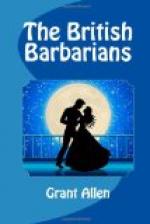“Whoever hesitates to utter that which he thinks the highest truth, lest it should be too much in advance of the time, may reassure himself by looking at his acts from an impersonal point of view. Let him duly realise the fact that opinion is the agency through which character adapts external arrangements to itself—that his opinion rightly forms part of this agency—is a unit of force, constituting, with other such units, the general power which works out social changes; and he will perceive that he may properly give full utterance to his innermost conviction; leaving it to produce what effect it may. It is not for nothing that he has in him these sympathies with some principles and repugnances to others. He, with all his capacities, and aspirations, and beliefs, is not an accident, but a product of the time. He must remember that while he is a descendant of the past, he is a parent of the future; and that his thoughts are as children born to him, which he may not carelessly let die. He, like every other man, may properly consider himself as one of the myriad agencies through whom works the Unknown Cause; and when the Unknown Cause produces in him a certain belief, he is thereby authorised to profess and act out that belief. For, to render in their highest sense the words of the poet—
’Nature is made better
by no mean,
But nature makes that
mean; over that art
Which you say adds to
nature, is an art
That nature makes.’
“Not as adventitious therefore will the wise man regard the faith which is in him. The highest truth he sees he will fearlessly utter; knowing that, let what may come of it, he is thus playing his right part in the world—knowing that if he can effect the change he aims at—well: if not—well also; though not so well.”
That passage comforts me. These, then, are my ideas. They may be right, they may be wrong. But at least they are the sincere and personal convictions of an honest man, warranted in him by that spirit of the age, of which each of us is but an automatic mouthpiece.
G. A.
THE BRITISH BARBARIANS
I
The time was Saturday afternoon; the place was Surrey; the person of the drama was Philip Christy.
He had come down by the early fast train to Brackenhurst. All the world knows Brackenhurst, of course, the greenest and leafiest of our southern suburbs. It looked even prettier than its wont just then, that town of villas, in the first fresh tenderness of its wan spring foliage, the first full flush of lilac, laburnum, horse-chestnut, and guelder-rose. The air was heavy with the odour of May and the hum of bees. Philip paused a while at the corner, by the ivied cottage, admiring it silently. He was glad he lived there— so very aristocratic! What joy to glide direct, on the enchanted carpet of the South-Eastern Railway, from the gloom and din and bustle of Cannon Street, to the breadth and space and silence and exclusiveness of that upland village! For Philip Christy was a gentlemanly clerk in Her Majesty’s Civil Service.




